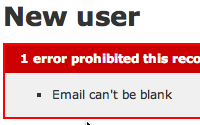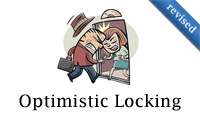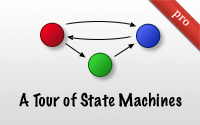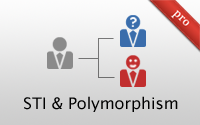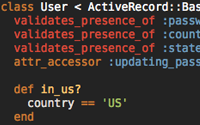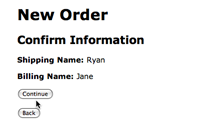Categories
- Active Record
- Active Resource
- Active Support
- Administration
- Ajax
- APIs
- Authentication
- Authorization
- Background Jobs
- Caching
- Code Walkthrough
- Controllers
- Debugging
- Deployment
- eCommerce
- Forms
- Mailing
- Models
- Performance
- Plugins
- Production
- Rack
- Rails 2.0
- Rails 2.1
- Rails 2.2
- Rails 2.3
- Rails 3.0
- Rails 3.1
- Rails 3.2
- Rails 4.0
- Refactoring
- Routing
- Search
- Security
- Testing
- Tools
- Views
Validations in Rails 3
Rails 3 offers several new additions to validations. Here learn how to make a custom error_messages partial, reflect on validations, and clean up complex validations in a model.
(9 minutes)
Virtual Attributes (revised)
Virtual attributes are a clean way to add form fields that do not map directly to the database. Here I show how to handle validations, associations, and more.
(11 minutes)
Optimistic Locking (revised)
There is a chance one user will unintentionally override someone else's changes if they update a record near the same time. One solution is to use optimistic locking. The updated_at column can also be used for this as shown.
(8 minutes)
Model Name in URL (revised)
A model's ID in the URL is not very helpful to the user. Consider adding the name which can also improve SEO. Learn how to override to_param, add a slug attribute, and make a catch all route for deep nesting.
(9 minutes)
A Tour of State Machines
Here I show how three popular state machine gems can be used to clean up a list of boolean/datetime fields. I also show a custom solution which keeps track of the history of events.
(12 minutes)
Multitenancy with Scopes
A multi-tenant application can be difficult to implement because the data for each tenant must be completely separate. Here I show how to do this using subdomains and default scopes in Active Record.
(12 minutes)
STI and Polymorphic Associations
Single Table Inheritance (STI) can help organize branching logic into separate classes, but a polymorphic association may be a better fit if there are unique database columns.
(14 minutes)
Active Record Reputation System
If you need to calculate an average user's rating or sum up a number of votes, consider using the activerecord-reputation-system gem. Here I will cover the basics and also briefly present a from-scratch solution.
(10 minutes)
Conditional Validations
By default, validations will take place every time the model is saved. Sometimes you only want a validation to happen when certain conditions are met. See how to do that in this episode.
(4 minutes)
Multistep Forms
See how to create a multi-step (wizard) form from scratch in this episode.
(15 minutes)

